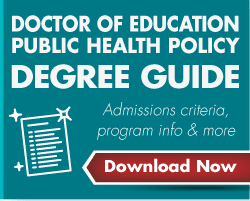 Now more than ever, there’s a need for forward thinking healthcare education administrators and public health policy leaders.
Now more than ever, there’s a need for forward thinking healthcare education administrators and public health policy leaders.
Getting your Doctor of Education in healthcare can help you achieve your career goals and make a positive impact on the health of communities.
How to Choose the Right EdD Specialization For You
With online doctoral programs, you can accelerate your career quickly while balancing your personal and professional life.
Doctoral programs at Nebraska Methodist College (NMC) are viewed as practice doctorates, and include extensive coursework and a culminating scholarly project.
The program, which can be completed in 24 months, consists of online courses along with two on-campus intensives. The NMC campus is located in Omaha, NE.
Students can choose between part- and full-time plans of study.
NMC offers two EdD program options:
- Education and Leadership in Healthcare
- Public Health Policy
Your EdD specialization selection will allow you to follow your desired career path and make a difference in the field of healthcare.
When choosing your doctoral track, you may want to consider your goals, potential salary, program duration, curriculum, job opportunities, tuition costs, college resources and more.
Identifying Your EdD Focus
When choosing EdD focus areas, you’ll want to consider your long-term personal and professional goals.
Here are some questions to ask yourself when considering your EdD in healthcare education:
- What are your aspirations and career goals?
- Are there career opportunities available with your current employer or in your geographical area?
- Would you be willing to move for the right job?
- What are the salary ranges of the jobs available?
- How much time can you commit to a graduate program?
EdD Specializations in Healthcare Education
You can get a Doctor of Education in Education and Leadership in Healthcare or Public Health Policy at NMC.
An EdD in Education and Leadership in Healthcare allows you to develop expertise in transforming organizational culture. You’ll hone your relationship-building skills, reflection, education, organizational awareness and accountability.
This program track has an institutional focus that provides expertise to work as leaders in academic and healthcare settings.
An EdD in Public Health Policy will allow you to influence change through population and public health initiatives and health policy. This program enhances your skill set so that you can positively influence public health, program development and higher education at a systems level.
Read more: Getting Your Doctor of Education in Public Health Policy Online
Comparing Specialization Curriculums
The Education and Leadership in Healthcare doctoral program can be completed in 24 months with full-time study or 36 months with part-time study.
You’ll take classes in organizational leadership, education and healthcare leadership, and complete a doctoral scholarly project.
The curriculum focuses on developing expertise in transforming organizational culture.
Some of the courses you’ll complete include, leadership in organizations, organizational change and accountability, legal and ethical issues in organizations, curriculum planning and evaluation, population health and healthcare finance.
An EdD in Public Health Policy can also be completed in 24 months with full-time study or 36 months with part-time study.
You’ll take classes in education, public health policy and healthcare leadership, and complete a doctoral scholarly project.
The curriculum focuses on leadership and program planning to address public health issues and population health issues.
Some of the courses you’ll complete include, curriculum planning and evaluation, healthcare policy, environmental health policy, advanced public health, public health ethics, population health and healthcare finance.
 Career Opportunities in Healthcare Education
Career Opportunities in Healthcare Education
Doctoral degrees in health professions give graduates the opportunity to pursue leadership career paths in higher education, healthcare administration or public health.
EdD career paths for each doctoral program specialization include:
Education and Leadership in Healthcare Doctorate
- College or university professor
- College or university researcher
- College or university program director
- Healthcare college or university administrator
- Healthcare administrator
Doctor of Education in Public Health Policy
- Public health consultant
- Health policy advisor
- Public health policy administrator
- Health and safety engineer
- Public health education or program specialist
- Manager or executive director of public health non-profit
- Health system administrator in population health initiatives
Read more: What Jobs Can I Get With a Doctor of Education
Market Demand for EdD-prepared Leaders
There is a demand for leaders in higher education and public health.
According to the U.S. Bureau of Labor Statistics, employment of postsecondary education administrators is projected to grow 4% through 2032.
The projected growth for public health leaders is 28% through 2032.
Evaluating EdD Program Resources
Graduate students experience unique challenges with online learning and time management.
During your doctoral program, you’ll most likely be balancing work and personal obligations with coursework.
At NMC, online students receive personalized guidance from the time they meet with an admissions coordinator until they reach graduation.
During your doctoral studies in health education, you’ll have access to:
- Expert faculty who have real-life experience in their teaching areas.
- A dedicated writing coach to assist with the design, structure, language and flow of your writing needs.
- An on-staff statistician to assist you in planning and evaluating your scholarly doctoral project.
- Counseling services that provide resources to promote health, work-life-school balance, and provide individualized support.
- Technology support to assist with online learning.
Read more: Steps to Succeed in Online Learning as a Graduate Student
 Making an Informed Specialization Choice
Making an Informed Specialization Choice
As you’re determining which doctoral specialization is right for you, you’ll also want to consider how graduate school is going to fit into your life.
Factors to consider as you’re finalizing your EdD specialization include:
- How you will manage time to study and complete your doctoral scholarly research project.
- Your support system.
- How you will pay for graduate school.
Cost and ROI Considerations
It’s important to consider the cost of your doctoral degree and the return on your investment.
For the 2024-2025 academic year, the cost per credit hour for EdD courses is $850. You can calculate the total estimated cost of your education using the Net Price Calculator.
Graduate students at NMC are eligible for financial assistance.
Assistance for graduate school can come from various sources, including NMC, the Methodist Hospital Foundation, federal and state governments, private foundations, employers and more.
You can work with a financial aid advisor and your employer’s human resources department to determine what financial aid and/or employee tuition assistance you’re eligible for.
Once you know the cost of your education and consider the financial aid you may receive, you should research your potential salary in your desired career.
Salaries for healthcare education administrators vary widely in the U.S. and are based on many factors including geography, job description, specialty and experience.
According to the U.S. Bureau of Labor Statistics, the median salary for postsecondary education administrators was $102,610 per year in 2023.
For public health administrators, the estimated annual salary is $114,601, according to Glassdoor.
Discussion on practical aspects such as program cost, duration, and potential returns.
Read more: How to Pay for Grad School
Preparing for Your EdD Journey
As you’re deciding on your EdD specialization path, you can schedule a meeting with an admissions coordinator.
They’ll be able to give you guidance on which track fits with your goals, what prerequisites you need and application deadlines.
Finalizing Your EdD Specialization Decision
You may already know what path you want to take in your doctoral program, which means your next step is to fill out an application.
If you’re still considering which EdD specialization is right for you, you can schedule a meeting with an admissions coordinator.
Talk to an admissions coordinator by emailing admissions@methodistcollege.edu or calling 402-354-7200.
Ready to find your EdD specialization? Learn more about our programs and take the first step towards your future in healthcare education!

